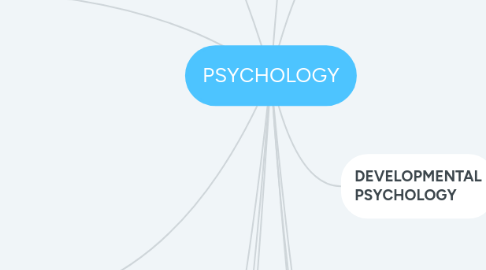
1. CLINICAL PSYCHOLOGY
1.1. Ligtner Witmer: creator of the term
1.2. Help for people in psychological difficulty
1.3. Uses 2 poles
1.3.1. Objective: test use
1.3.2. Subjective: exam/test situation
1.4. Daniel Lagache : "Psychology is not phylosophy".
2. EDUCATIONAL PSYCHOLOGY
2.1. William James : 1899 wrote "Talks to Teachers"
2.1.1. analyzes the relationship between psychology and teaching
2.2. 2 types of teaching
2.2.1. Teaching by objective
2.2.1.1. Theory of Ludwig van Berrallanly
2.2.1.1.1. An objective can be achieved from a different starting point and with different means.
2.2.1.2. Learning skills and attitudes
2.2.2. Programmed teaching
2.2.2.1. Skinner's Theory
2.2.2.1.1. Our behaviours are influenced by their consequences but also by the environment.
3. PSYCHOLOGY OF ORGANIZATIONS
3.1. present in companies; management technique
3.2. Taylor : the first to analyze the study of work in companies
3.3. Maslow's Theory of Needs
3.3.1. Motivation by hierarchy of needs
3.4. Elton Mayo
3.4.1. human relationship
3.5. Several topics
3.5.1. Communication
3.5.2. Conflict Management
3.5.3. Power relationship
3.5.4. Motivation and involvement at work
3.5.5. The different types of management
4. HUMANISTIC PSYCHOLOGY
4.1. Created in 1960 in the USA by : A.Maslow / C.Rogers / V.Frankl
4.2. provides the most complete description of living as a man or a woman and understanding the realization of one's potential.
4.3. Regarded as the third force of psychology
4.4. Allows the development of :
4.4.1. human potential
4.4.2. freedom
4.4.3. creativity
4.4.4. self-improvement
4.4.5. responsibility
5. EMOTIONS PSYCHOLOGY
5.1. 2 theories on emotion studies
5.1.1. James (1884) and Lange (1885)
5.1.1.1. Each type of emotion corresponds to a different way of structuring and interpreting sensations.
5.1.2. Cannon
5.1.2.1. The brain that creates the emotion that it then interprets
6. PSYCHOANALYSIS
6.1. Sigmund Freud
6.2. Method for investigating mental processes
6.3. A lot of influence on today's psychology
6.4. But also much criticized
7. NEUROPSYCHOLOGY
7.1. studies the functioning and structure of our brain
7.2. Hippocrate
7.3. Platon :"The brain watches over the body and is the guardian of intelligence."
7.4. Wernicke (1874) and Lichtheim They create : "The model of understanding and production"
8. COGNITIVE PSYCHOLOGY
8.1. studies the system for processing information such as perception or speech
8.2. For several writers : H.Simon / N.Chamsky / M.Minsky / J. Carhty
8.2.1. Human intelligence = Intelligence of a computer
8.3. Ulric Neisser wrote "Cognitive Psychology" in 1967.
8.3.1. The first historical reference in cognitive psychology.
9. DEVELOPMENTAL PSYCHOLOGY
9.1. studies the different stages of life and human development.
9.2. 1st appearance : 19th century by C.Darwin and W.Preyer
9.3. takes into account people's environment
9.4. 3 approaches
9.4.1. Longitudinal: Following the same individuals at different times in their lives.
9.4.2. cross-sectional: study of different individuals in the same age groups
9.4.3. sequential: combination of longitudinal and cross-sectional approaches.
10. BEHAVIORAL PSYCHOLOGY
10.1. Today it's very close to cognitive psychology.
10.2. Analyzes people's behaviour such as anxiety and phobia.
10.3. Ivan Pavlov: emergence of the behaviourist trend
10.4. 1924 : Mary Cover Jones : 1st behavioural therapy
11. POSITIVE PSYCHOLOGY
11.1. Create by Martin E.P.Seligman in 1998
11.2. A study wrote by Shelly Gable in 2005
11.2.1. Tiltle of study : What (Why) is positive psychology
11.2.1.1. study of the conditions that contribute to the development of the individual
